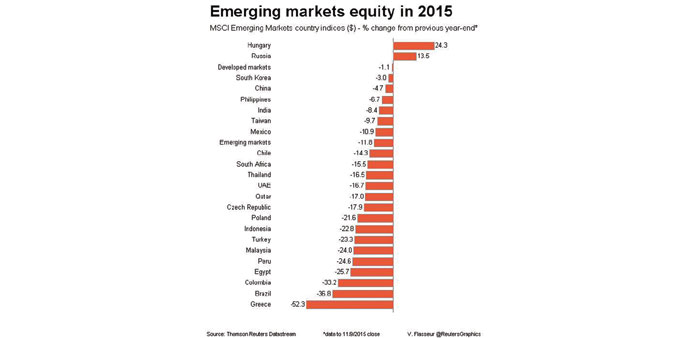Bloomberg
London
Emerging-market stocks fell to a five-week low as the growing risk of deflation in China raised doubts the global economy can withstand an increase in US borrowing costs.
Hong Kong-traded Chinese shares dropped the most since September. Egyptian equities headed for their biggest three-day decline in 17 months as concern about the country’s security situation increased pressure on policy makers to devalue the pound. Dubai stocks retreated to the lowest this year and Qatar’s benchmark index posted for the longest slump in 12 years. Brazil stocks slid for a third day. Russia’s ruble and Indonesia’s rupiah strengthened against the dollar.
The likelihood the Federal Reserve will increase interest rates on December 16 has surged to two-thirds from one-third two weeks ago, signals from the futures market suggest.
Concern that higher lending rates in the US will spur investors to dump emerging-market assets fuelled a $6tn meltdown in developing-nation stocks this year before expectations for a delay caused a rebound. As more investors reconcile to Fed action next month, their focus is turning to China’s economic health.
“One of the major headwinds facing emerging economies at this stage of the cycle is the collapse in demand,” Joseph Dayan, head of markets at BCS Financial Group in London, said by e-mail. “You have an imminent rate hike in the US that is driving up the dollar, which is not supportive for emerging- market growth. At the same time, there is no obvious signs in pick-up of Chinese demand.”
The MSCI Emerging Markets Index fell 1.4% to 831.95 in New York, its fourth day of losses. Data showed China’s consumer inflation waned in October while factory-gate deflation extended a record streak of negative readings. Federal Reserve Bank of Boston President Eric Rosengren said encouraging US data makes it appropriate for the Fed to consider raising rates as soon as next month.
The Hang Seng China Enterprises Index slid 1.8%. China’s consumer-price index rose 1.3% in October, official data showed, compared with the 1.5% median estimate in a Bloomberg survey. The producer-price index fell 5.9%, extending its streak of negative readings to 44 months. The weak data may open the door for more stimulus as inflation remains about half the government’s target pace.
“The risk of deflation has accentuated,” Liu Li-Gang, the chief Greater China economist at Australia & New Zealand Banking Group in Hong Kong, said after the China report. “This requires the People’s Bank of China to engage in more aggressive policy easing.”
Egyptian stocks fell the most in the world as the benchmark EGX 30 Index lost 4.4% and the nation’s dollar-bonds fell. The country’s tourism industry is in a crisis after a Metrojet plane was downed over the Sinai peninsula, stirring concern the security situation is worsening. That, coupled with increases in borrowing costs by state-run banks, pushed traders to wager that policy rates will be increased.
Investors are being driven away by “the security situation, given tourism is a key sector, and the fact that the big two countries for tourists, Russia and the UK, are pulling people out,” Tim Ash, head of EMEA credit strategy at Nomura International in London, said by e-mail.
Investors would prefer just to see focus on improving the security situation to make it save for tourists to return.”

